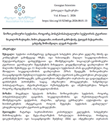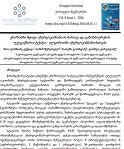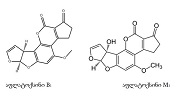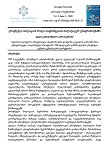SOME PHYSICOCHEMICAL PROPERTIES OF GEORGIAN BENTONITE CLAY
Загрузки
Clay minerals are known as biocompatible materials and have been utilized for medicinal aims from long ago. Currently, bentonite clays have also been widely investigated for broad spectrum of new applications in many biomedical spheres due to their unique properties - expansion and adsorption abilities - which are very useful in pharmaceutics, cosmetics, drug delivery systems and tissue engineering. Swelling has a significant impact on the rheological and physical properties of clay. It depends on many factors including temperature, pH, and polarity. In addition, since bentonites have negative surface charge they possess high adsorption ability for cationic elements. The priority task at the I. Kutateladze Institute of Pharmacochemistry TSMU is to extend the biopharmaceutical application of Georgian bentonite clay. Several semisolid formulations were proposed on the bases of the preparation - Tikha Ascane (TA), received from the clay of Askana Deposit (Ozurgeti region of Georgia). In this study we investigated the swelling capability of TA in the presence of different temperatures, polarities and pH; the interaction behaviour of bentonite with cationic compounds was also evaluated. As many researches are focused on the combination clay minerals with cationic polymers for the preparation of effective therapeutic systems, we examined the suitability of TA as a substrate for the obtaining hybrid composites with biopolymer Chitosan (CS). The samples were characterized by examining FTIR spectra and morphology. The obtained data indicate that swelling capability of TA is affected by temperature, pH, and polarity of solutions. FTIR analysis showed that cationic drug and polymer (CS) can be successfully incorporated in TA through adsorption and formation chemical bonds. Microscopic analyses demonstrated homogeneity of TA-CS composites. These results will be used in future for preparing drug - clay or drug - polymer composites based on TA for biomedical application.
Скачивания
Sanchez-Olivares G., Calderas F., Medina-Torres L., Sanchez-Solis A., Rivera-Gonzaga A., Manero O. “Clay Minerals and Clay Mineral Water Dispersions — Properties and Applications,” Clays, Clay Minerals and Ceramic Materials Based on Clay Minerals, Mar. 2016; doi: 10.5772/61588.
Ghadiri, M., Chrzanowski, W., Rohanizadeh, R. Biomedical applications of cationic clay minerals. RSC Advances, 2015; 5(37):29467–29481. doi:10.1039/c4ra16945j
Park, J., Shin, H., Kim, M.H., Kim, J., Kang, N., Lee, J., Kim, K., Lee, J.I., Kim, D. Application of montmorillonite in bentonite as a pharmaceutical excipient in drug delivery systems. Journal of Pharmaceutical Investigation, 2016; 46: 363 - 375.
Krupskaya VV., Zakusin SV., Tyupina EA., Dorzhieva OV., Zhukhlistov AP., Belousov PE., Timofeeva MN. Experimental Study of Montmorillonite Structure and Transformation of Its Properties under Treatment with Inorganic Acid Solutions. Minerals. 2017; 7(4):49
Phatak A.A., Rahane P.S. intercalation of itraconazole into montmorillonite: effect on release of drug. wjpmr, 2018; 4(12):179-183
Hristodor et al. Textural and morphological characterization of chitosan/bentonite nanocomposite Environmental Engineering and Management Journal, 2012; 11 (3): 573-78
Thakur G., Singh A., Singh I. Chitosan-Montmorillonite Polymer Composites: Formulation and Evaluation of Sustained Release Tablets of Aceclofenac. Sci Pharm. 2015; 84(4):603-617
Bernkop-Schnürch, A., Dünnhaupt, S. Chitosan-based drug delivery systems. European Journal of Pharmaceutics and Biopharmaceutics, 2012; 81(3): 463–469. doi:10.1016/j.ejpb.2012.04.007
Tsagareishvili GV. Some results of research and application of bentonites of Georgia in pharmacy and medicine" - Tbilisi. "Metsniereba". 1974. 130 (in Russian).
Aladishvili V.A. The use of bentonite of the Askane deposit in medicine. Tbilisi. 1969. 24-27 (in Russian).
Tsiklauri, L., Dadeshidze, I., Tsagareishvili G. Study of the Stability and Specific Activity of the Emulsion Containing Sea-Buckthorn (Hippophae rhamnoides L.) Oil and Ticha - Ascanae. Bulletin of the Georgian Academy of Sciences. 1998; 157(2):251-253.
Tsiklauri, L., Tsagareishvili, G. Gastroenterological and dermatological soft drug formulations containing Georgian bentonite clay preparation – Thicha-ascanae. Tbilisi. Universal. 2011, 89, (ISBN 978-9941-17-458-2) (in Georgian).
Tsiklauri, L., Getia, M. Formulation and assessment of clay - polymer hydrogel based on Georgian bentonite. GEORGIAN SCIENTISTS, 2023; 5(1):72–80. https://doi.org/10.52340/gs.2023.05.01.05
Tsiklauri L., Getia M, Bakuridze A. Physicochemical characteristics of fresh and lyophilized Georgian royal jelly and Formulation bentonite-based cream. Georgian Scientists. 2022; 4(5):164-174.
Christian, W., Zainab, B., Tian, K., & Abichou, T. Effect of specimen preparation on the swell index of bentonite-polymer GCLs. Geotextiles and Geomembranes. 2020; 48(6):875-885
Ahmed, A. A., Saaid, I. M., Akhir, N. A. M., Rashedi, M. Influence of various cation valence, salinity, pH and temperature on bentonite swelling behaviour. : AIP Conference Proceedings, 2016; 1774, 040005 doi:10.1063/1.4965087
Patel, S., Jammalamadaka U., Sun L., Tappa K., Mills DK. Sustained Release of Antibacterial Agents from Doped Halloysite Nanotubes. Bioengineering (Basel). 2015; 3(1):1.
Chavali, R. V. P., Ponnapureddy, H. P. R. Swelling and compressibility characteristics of bentonite and kaolin clay subjected to inorganic acid contamination. International Journal of Geotechnical Engineering, 2017; 12(5):500–506
Rahman, S K., Sharma, B. Swelling Behavior of Bentonite- Sand Mixtures in the Presence of Organic Pore fluids, Soil and Sediment Contamination: An International Journal. 2023; 32(2):179-193, DOI: 10.1080/15320383.2022.2066626
Márquez, CO., García, VJ., Guaypatin, JR., Fernández-Martínez, F., Ríos, AC. Cationic and Anionic Dye Adsorption on a Natural Clayey Composite. Applied Sciences. 2021; 11(11):5127.
Ragab, A.; Ahmed, I.; Bader, D. The Removal of Brilliant Green Dye from Aqueous Solution Using Nano Hydroxyapatite/Chitosan Composite as a Sorbent. Molecules, 2019; 24: 847. https://doi.org/10.3390/molecules24050847
Aljofan, M., Sganga, ML., Lo, MK., et al. Antiviral activity of gliotoxin, gentian violet and brilliant green against Nipah and Hendra virus in vitro. Virol J. 2009; 6:187
Perry, B.N., Govindarajan, B., Bhandarkar, S.S., et al. Pharmacologic blockade of angiopoietin-2 is efficacious against model hemangiomas in mice. J. Invest. Dermatol. 2006; 126(10):2316–2322.
Zhang, X., Zheng, Y., Fried, LE., et al. Disruption of the mitochondrial thioredoxin system as a cell death mechanism of cationic triphenylmethanes. Free Radic Biol Med. 2011; 50(7):811-820.
Coşkun, Yİ., Aksuner, N., Yanik, J. Sandpaper Wastes as Adsorbent for the Removal of Brilliant Green and Malachite Green Dye. Acta Chim Slov. 2019; 66(2):402-413.
Lia Tsiklauri (ORCID 0000-0002-7808-5329) – Senior research scientist, Iovel Kutateladze Institute of Pharmacochemistry, TSMU;
Malkhaz Getia (ORCID 0000-0001-7729-8042) - Principal research scientist, Iovel Kutateladze Institute of Pharmacochemistry; TSMU



























































































































































































































